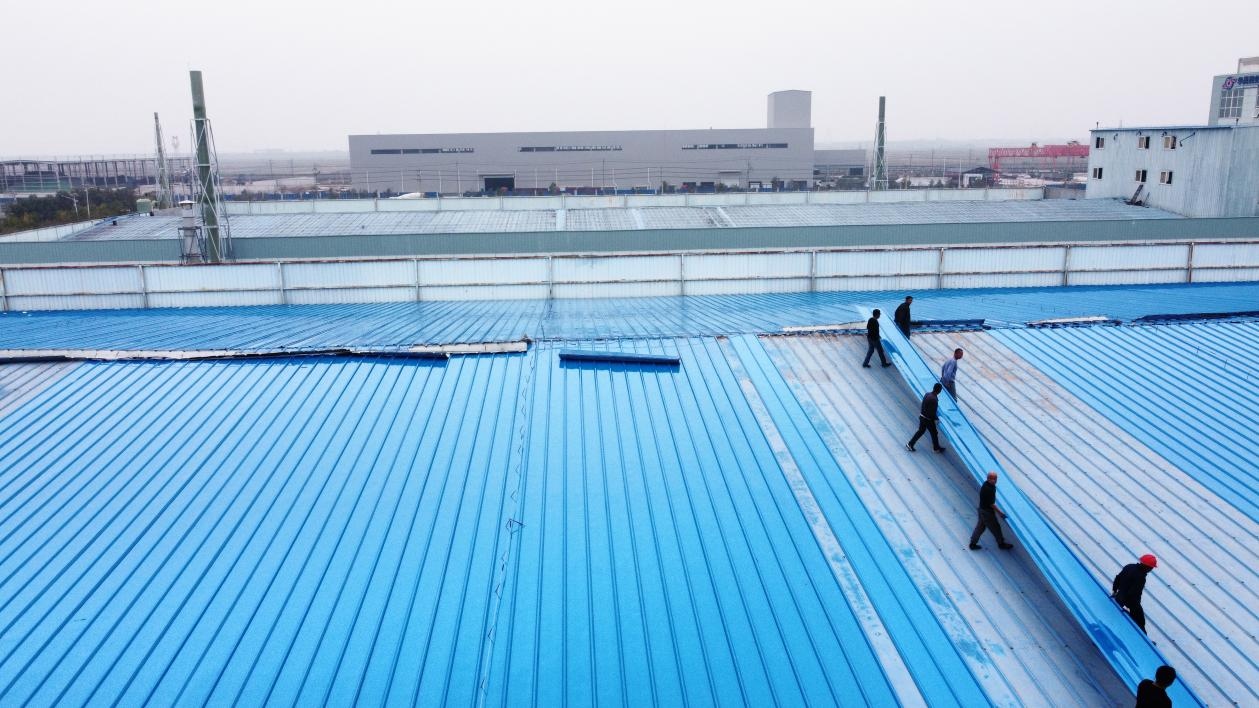For any manufacturing or farming company, the roof choice is a high-risk decision involving everything from availability to long-term cost of capital. In atmospheres where chemical vapors, weather conditions, and mechanical stresses are everyday occurrences, a deteriorating roof is not an inconvenience—it’s a company-killing hazard. Short-term band-aids made by conventional materials aside, there has to be an engineering solution in order to battle the ongoing war against corrosion.
This research demonstrates the manner in which TSP film-coated steel, a special-use composite material, offers increased durability and a significantly lower cost of ownership than all conventional types of roofing.
Developed by Jieli since 2016, the technology behind TSP film-coated steel is completely different from old-fashioned coatings. Instead of a sprayed-on layer of paint or plastic, TSP uses a special polyester film. This film is attached to a good-quality steel substrate at the factory.
This process results in a protective shield that is seamless, non-porous, and monolithic. This difference is key. All spray-on coatings, no matter how thick, are naturally likely to have tiny flaws. These include pinholes, bubbles, and chain scission. These flaws create ways for corrosive materials to attack the steel. This is the main reason for the pitting, delamination, and early failure often seen with regular steel sheets. So, TSP’s technology gets rid of this basic problem completely.
The advantage in theory of this bonded film is confirmed by a lot of certified tests that copy the toughest industrial situations.
In tests by the National Test Center of Polymer & Building Materials (CNAS L1049), the material was soaked for 168 hours in a series of very corrosive chemicals, including 20% Sulfuric Acid and 15% Hydrochloric Acid. The result was simple: zero flaws, corrosion, or breakdown.
TSP is designed to work well from -40°C to 160°C. It passed a tough 50-cycle freeze-thaw test and a 6-hour boiling water test with no damage. This shows its strength against sudden temperature changes and moisture that cause other materials to warp, crack, or delaminate.
The bond between the film and steel is very strong. Even when put through a 90° bend test, the material showed no cracking or peeling. This flexibility is vital during installation. It is also important for long-term resistance to impacts and structural stress.
With an A-Grade fire rating, TSP steel is self-extinguishing. This is a must-have feature for industrial safety rules. Besides, it also reduces background noise by 25-30 dB, which helps make the work environment safer and more productive.
When compared directly with regular materials, TSP’s data-supported benefits are obvious.
The main difference here is how long they last. Because its sprayed coating naturally has tiny holes, a traditional steel roof in a corrosive place often lasts only 2-3 years. TSP’s perfect barrier is proven to handle a 1000-hour salt spray test with no rust. Thus, it is backed by a 15-year warranty, offering ten times the dependable service life.
This is about physical stability and strength. UPVC is easily damaged by heat, which leads to warping and structural problems (“cannot use long truss span”). With its steel core and extremely low coefficient of thermal expansion (1.6-1.8 x 10⁻⁵ mm/mm/°C), TSP keeps its shape and strength in high temperatures where UPVC breaks down. This makes it a great choice for large-span industrial buildings.
This comparison shows which one is right for certain jobs. While stainless steel can handle general moisture from the air, it has a major weakness to specific industrial chemicals and chlorides (salt). As the data shows, it “cannot resist better the corrosion from Strong acid, alkali and salt.” TSP is proven to be resistant to this exact group of chemicals. This makes it the better and cheaper option for chemical plants, coastal buildings, and food processing factories where stainless steel would corrode fast.
Choosing a roofing material is not about the starting price; it’s about the total cost over time. TSP film-coated steel offers a clear advantage. It brings a big decrease in maintenance, almost no need for replacements, and the prevention of expensive operational downtime. Its advanced technology provides a strong, dependable, and long-lasting solution to the most difficult environmental problems. This makes it a smart investment to protect your business and keep it running.
A: Absolutely. The value of TSP steel is in its overall cost in the long run. A traditional painted roof might need to be replaced every 2-3 years in a corrosive place, which means you repeatedly pay for materials, labor, and operational downtime. TSP steel’s 15-year warranty guarantees a much longer service life, making it a smarter and more dependable investment over time.
A: The key benefit is getting rid of tiny holes. Spraying technology, even with many layers, cannot create a completely even, non-porous barrier. This leaves the steel open to attack. TSP’s process of bonding a solid, pre-made film creates a totally airtight and seamless seal, giving 100% protection against corrosive agents from the very first day.
A: It is made exactly for these situations. Its airtight seal stops moisture from ever touching the steel core, which prevents the chemical reactions that lead to rust. Its performance is proven in a 1000-hour salt spray test where it showed no rusting. This makes it a perfect choice for coastal buildings, chemical plants, and agricultural facilities in wet areas.
